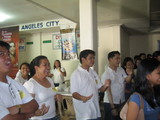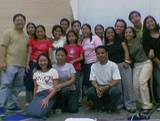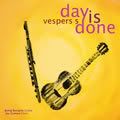 2
comments
|
Wednesday, November 15, 2006
2
comments
|
Wednesday, November 15, 2006

Developing talent is empowerment. Sharing one's skills is giving hope.
My experience of giving Liturgical Music Seminars and Workshops in different parishes exposed me to the various needs of parish choirs, especially poor churches who do not have access to resources. These choirs articulated their need through survey forms. A bulk of these surveys have been gathered in a grand choir workshop at the Ateneo de Manila University High School, organized by BukasPalad in July 2004.
Choirs said that they have problems choosing songs. What songs to use for particular masses? What is appropriate for each part of the mass? They also have questions about the delineation of tasks. What are the roles and responsibilities of church musicians? They said that they lack vocal skills, so they asked, “How does one sing well?” Moreover, the choir is not just a ministry, it is also an organization. What is the ideal organization of a choir in a parish? Furthermore, a large number had problems dealing with the parish priest, people in charge of parish worship or problems within the organization. How do they dialogue with their parish priest who may or may not know the liturgical norms for music? How do they deal with personal problems among choir members that are affecting the ministry and the choir itself?
These questions led me to form a choir that is particularly intended to pass on skills they learn at the Jesuit Music Ministry. The idea is to form a core choir of choral leaders to be trained by a professional coach so that they will in turn pass on the skills and know-how to their particular choirs. Thus, they are not to abandon their choirs. Moreover, if this choir has to articulate the faith of the masses, they should come from the masses. A composer once told to compose songs with social relevance and a sound that could capture the heart of the masses casually remarked, “How could I? I grew up listening to the classics!”
Canto Cinco or C5 has been organized for this purpose. They have recorded a training CD with vocal exercises, taken from the vocal class they attended. This CD is not for sale and is given to the choirs who attend the Liturgical Music Seminar. They in turn help give vocal workshops to choirs who need them. They primarily accompany me give the Liturgical Music Seminar while they take turns explaining the parts of the body used in singing, and then give exercises to develop each part. Though canto is song in Italian, it also puns on their primary apostolate: to go the masses, to the kanto (sidestreets). Cinco verbalizes the five core values that a choir must have: Christ-centeredness, creativity (choirs can compose their own songs), competency (they should be good singers in order to lead people to sing well), community, and commitment.
 It is also undeniable that forming this choir makes my work a little bit easy. The demands are great, but the availability of people who can give them is dim. Besides, the church has recognized that the Holy Spirit works with the laity.
It is also undeniable that forming this choir makes my work a little bit easy. The demands are great, but the availability of people who can give them is dim. Besides, the church has recognized that the Holy Spirit works with the laity.
Furthermore, training is effective for people who has the talent, but does not have the resources to develop them. A remark from a meeting jolted me, “talent is innate.” It is indeed true, but when left with a given --- you see a Jesuit here with a good voice, but does not possess the great talent of a Beethoven, the next best thing is training. Training tells another that whatever gift he or she has --- even if it is as small as a mustard seed --- and gives his or her all through practice will produce fruits greater than a genius who sleeps all day. Or, wait for a genius to apply and be accepted. The remark, ‘talent is innate’ is to close the door to many of us. Training empowers. It should therefore be available to all, and not just to a particular and singular group given favor in history.
*Liturgical Music Seminars in Pampanga and Tayuman with C5
Labels: albums, c5, choir, filipino, fr. jboy, Jescom, jesuit, jmm, liturgical, liturgical music, liturgy, meditation, ministry, music, religious, training, vocal workshop











2 Comments:
Hi. Im just wondering about the vocal training cd u just mentioned. Im Joven from Chicago. Im a member of a filipino choir here. Can you tell me how and where can i get that vocal training cd/s? It'll be a great help for other filipino choirs here. God Bless!
11/23/2006 10:25 AM
Hi joven,
i'll devise a way to produce the CD. It is actually free. Will inform as soon as we can reproduce the exercises.
thanks joven.
fr. jboy SJ
11/24/2006 3:28 AM
Post a Comment
<< Home